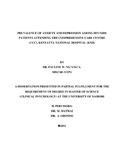| dc.description.abstract | Background: Psychiatric morbidity has been associated with HIV disease since the beginning of the AIDS epidemic. Despite the epidemic, minimal research has been done locally on the prevalence of various psychiatric morbidities associated with the infection.
Methods: This was a descriptive cross - sectional study which aimed to investigate prevalence of anxiety and depression among HIV I AIDS patients attending the Comprehensive Care Clinic (CCC) at Kenyatta National Hospital (KNH) who fulfilled the inclusion criteria. The study was carried out between April and August 2010. Patients were recruited through systematic sampling, and a questionnaire using Becks Depression and Anxiety Inventory was administered. The statistical package for social sciences (SPSS) version 13 for windows was used to analyze the data by applying descriptive and inferential statistics. Ethical approval to conduct the study was granted by KNH and University of Nairobi ethical committee.
Results: Four hundred (n = 400) patients living with HIV of whom 62.2% (248) were female participated in the study. The mean age of the patients was 39 years (SD 8.84). Majority of the patients were married (48.3%), had secondary level education (41.5%), were engaged in skilled occupations (42.5%) and practiced Protestantism (50.1%) while 37% were Catholics. Depression was more prevalent than anxiety among HIV positive patients in the study. The overall prevalence of depression was 47.25%. The prevalence of mild, moderate and severe depression measured on the Becks' Depression Inventory was 9.75%, 25.25% and 12.25%, respectively. Overall, 22.75% of the HIV patients had significant anxiety with 15.5% having moderate levels of anxiety and 7.25% having severe anxiety levels based on the Becks Anxiety Inventory. The factors that showed a statistically significant association with depression were patient's gender (p =0.001), level of education (p = 0.001) and income (p < 0.001). Anxiety was significantly associated with level of education (p = 0.035).
Conclusion: Patients with HIV/AIDS receiving follow up care still experience considerable anxiety and depression levels. These patients can benefit from improved delivery of psychiatric care and sustained counseling during follow up in CCC. | en_US |

